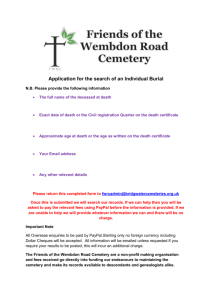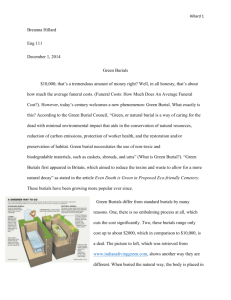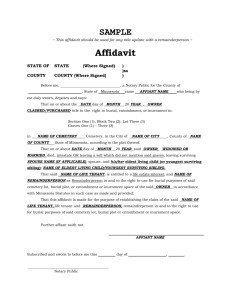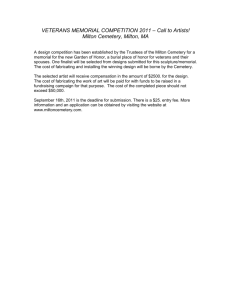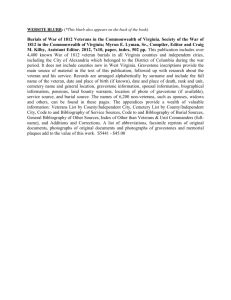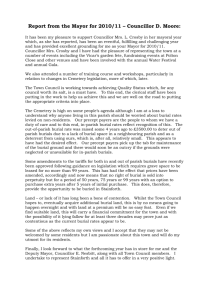Burial Outside a Proclaimed Cemetery - Policy
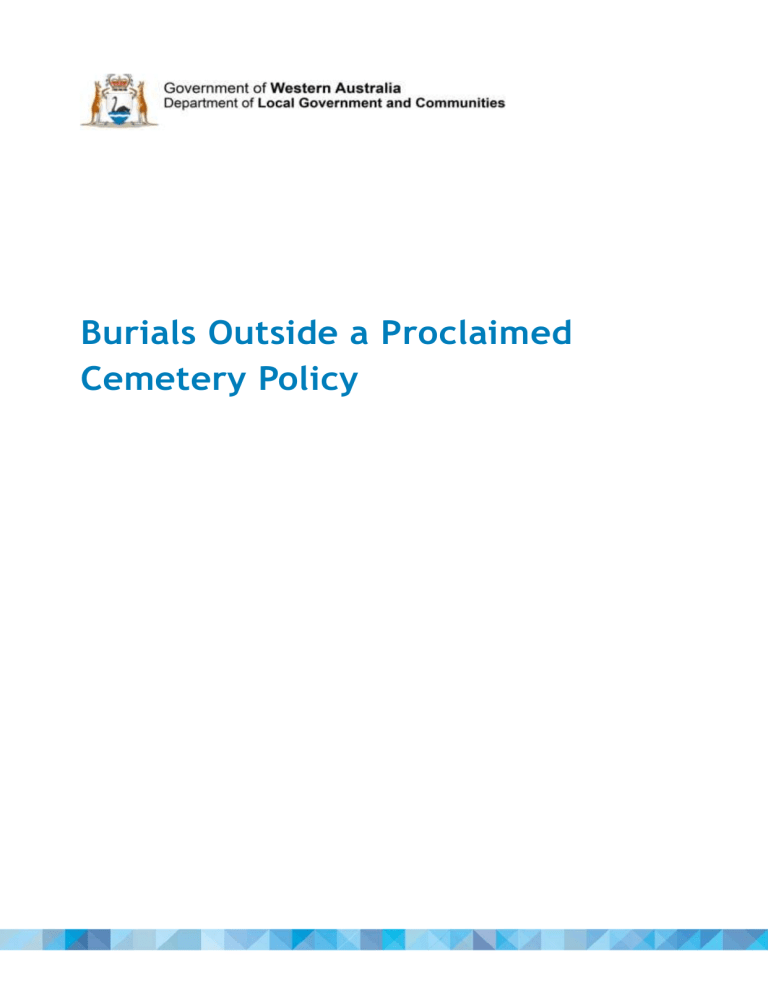
Burials Outside a Proclaimed
Cemetery Policy
Contents
What are the disadvantages of being buried outside a proclaimed cemetery? ........... 4
Why are burials outside proclaimed cemeteries sometimes allowed? ........................ 5
Burials Outside a Proclaimed Cemetery Policy, December 2014 - Page 2 of 8
Burials Outside a Proclaimed Cemetery
Burials in the State of Western Australia are governed by the Cemeteries Act 1986 . The
Act effectively provides that a person cannot be buried in a place other than a cemetery that has not been closed.
The Minister does, however, have the power to authorise a burial in a place other than a proclaimed cemetery. Specifically:
S12. Minister may authorise burial
The Minister may authorise the burial of a dead body in a place other than a cemetery where —
(a) the burial is to take place on land that is reserved under the Land
Administration Act 1997 for the purpose of burials but is not a cemetery; or
(b) the Minister is satisfied that the burial is to take place in an area that is visibly set apart for and distinguishable as a burial place.
The Minister will exercise his discretion in exceptional circumstances. This paper outlines the basis on which the Minister will make the decision and sets out the process for applying for approval.
Why is there a requirement to be buried in a cemetery?
It is important that a deceased person is treated with respect.
If a decision is made by that person and/or their family that burial is the chosen method of disposal, a number of matters need to be taken into account:
providing for a respectful resting place
continued access to the site for grieving family members both now and into the future
ensuring that the site is protected into the future, and remains undisturbed as much as is practicable
protecting public health and safety, and
preventing environmental harm.
Burials Outside a Proclaimed Cemetery Policy, December 2014 - Page 3 of 8
Consequently, the most appropriate place for a burial to occur is in a proclaimed cemetery. These are managed under the Cemeteries Act 1986 in perpetuity by cemetery boards or local government authorities, which have the expertise and resources necessary to maintain both the land and the cemeteries in good condition.
What are the disadvantages of being buried outside a proclaimed cemetery?
You cannot require that private land is kept in the family indefinitely into the future 1 .
Burial on private land could therefore potentially cause problems for the sellers of land as buyers may be unwilling to purchase land on which there are graves. It is also problematic for potential buyers as the burial compromises the current and future use of the land. It is strongly recommended that all burials on private land be registered with
Landgate on the Certificate of Title to ensure that all potential buyers, or others with an interest in the land, are fully informed. In certain circumstances, the Minister may direct you to register the burial on the Certificate of Title as a condition of approval.
Burial on private land can also lead to graves which are damaged or no longer able to be identified and/or located due to stock grazing, pastoral activities, exposure to the elements, erosion or someone’s actions, inadvertent or otherwise.
Families, including descendants, have no right of access. Access is dependent upon the approval of the current land owner. Although possible, making application to have remains exhumed and reinterred elsewhere when leaving the area is an involved process requiring Ministerial approval, which can be both distressing and costly for all involved.
1 Both the common law and equity have long been concerned to control the use and disposition of property by the dead hand from beyond the grave. The rule against perpetuities was formulated as part of the rules against remoteness of vesting by the courts to prevent people tying up property – both real and personal – for generation after generation. In essence, the purpose of the rule is to ensure that someone owns property absolutely and for their own benefit, within the time provided. This is further enshrined in legislation in Western Australia in the Property Law Act 1969.
Burials Outside a Proclaimed Cemetery Policy, December 2014 - Page 4 of 8
Why are burials outside proclaimed cemeteries sometimes allowed?
It is recognised that special circumstances may exist that could lead to the Minister giving approval for burial in a place other than a proclaimed cemetery. This will, however, only be given in very limited circumstances.
A number of factors are taken into account:
the distance from the nearest proclaimed cemetery. If the family is not able to undertake the return trip to the nearest cemetery in a day, special consideration may be given, and
whether there is a particularly significant association with the land. This is either - o historical – generally this will be considered to be where the person has a direct and continuous association to the land for at least three (3) generations, and has resided on the land for at least 30 years, either as a landowner, lessee/licensee or employee, or o traditional or cultural
– the person has a particularly significant traditional or cultural association to the land, or o immediate family members are already buried at the burial site.
Consideration will also be given to whether the granting of the request will create a risk to health or other nuisance, or cause reasonable offence to others. This may include requiring an environmental report to ensure any burial would not impact on a public water supply or unreasonably damage the land. Any such ancillary costs will need to be borne by the applicant.
Land reserved under the Land Administration Act 1997 for the purposes of burials includes those cemeteries that have been closed. In this situation, a person may request burial with other members of their family who are already buried there.
What is required if an application is being made?
1. In all cases, the burial place must be an area that is visibly set apart for and distinguishable as a burial place. The application must be accompanied by a map and photographs or drawings clearly showing where the burial site is geographically located, and where in the existing burial ground that the grave is proposed to be
Burials Outside a Proclaimed Cemetery Policy, December 2014 - Page 5 of 8
dug. The GPS location should be provided, if possible. Existing graves should be marked on the drawing.
2. In the case of land reserved under the Land Administration Act 1997 for the purposes of burials, written advice from the relevant cemetery board or local government stating that there is available space and that the land is suitable for the proposed burial.
3. A death certificate or, where it is applicable, a Coroner’s Order giving approval for the burial to take place. Approval will not be given in advance of death.
4. Written consent of the next of kin to the burial.
5. Written consent of all of the parties with claim over the land. If the land is privately owned, this is by the landholders. In the case of Indigenous burials on Aboriginal
Lands Trust estate, this will be by the local Indigenous bodies/corporations with responsibility for the management of the land. If there are multiple Indigenous bodies or corporations with interest in or ownership of the land, it is important to gain consent from all parties involved to ensure that the burial has community support.
For burials in a closed cemetery, a letter of consent from the relevant cemetery board or local government is required, stating that they support the burial and that the cemetery has the capacity for it.
6. Reasons for seeking the burial in that particular place (e.g. a letter detailing the deceased’s connection to and history with the land).
7. The proposed date of burial. You should allow seven days after receipt of all requested information for the application to be processed and a decision made.
This will also give you time to make the necessary arrangements.
How do I make an application?
Complete the application form and send it to:
Department of Local Government and Communities
GPO Box R1250, PERTH WA 6844
Fax: (08) 6552 1555
Email: info@dlgc.wa.gov.au
For assistance, phone (08) 6551 8700 or 1800 620 511 (toll free for country callers only) or visit our website at www.dlgc.wa.gov.au
We realise that this is a stressful time for families and we will make every effort to process the application quickly so that a decision can be made and you can make the
Burials Outside a Proclaimed Cemetery Policy, December 2014 - Page 6 of 8
necessary funeral arrangements. To help us, please ensure you fully complete the application form and attach all of the necessary documents.
Disclaimer : The information and advice within this document is provided voluntarily by
Department of Local Government and Communities as a public service. The information and advice is provided in good faith and is derived from sources believed to be reliable and accurate. No representation or warranty, express or implied, is made as to the accuracy, completeness or fitness for purpose of this document. The reader of this document should satisfy him or herself concerning its application to their situation. The
State of Western Australia, the Department of Local Government and Communities and their officers expressly disclaim liability for any act or omission occurring in reliance on this document or for any consequences of such act or omission. Current as at
December 2014.
Burials Outside a Proclaimed Cemetery Policy, December 2014 - Page 7 of 8
For more information, please contact:
Department of Local Government and Communities
Gordon Stephenson House,
140 William Street, Perth WA 6000
GPO Box R1250, Perth WA 6844
Telephone: (08) 6551 8700
Fax: (08) 6552 1555
Freecall: 1800 620 511 (Country only)
Email: info@dlgc.wa.gov.au
Website: www.dlgc.wa.gov.au
Translating and Interpreting Service (TIS) – Tel: 13 14 50
Burials Outside a Proclaimed Cemetery Policy, December 2014 - Page 8 of 8

